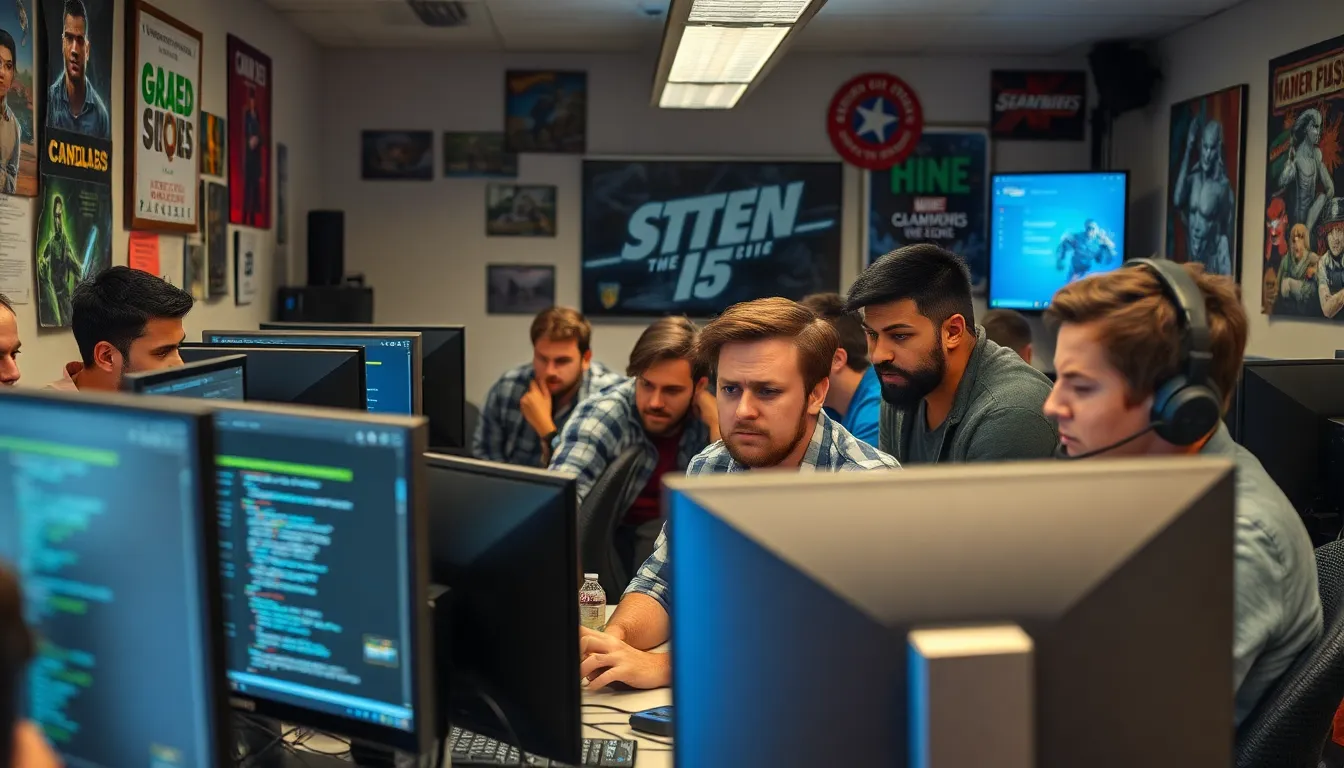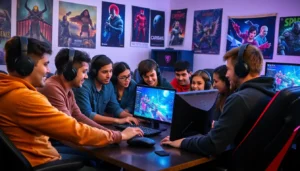Table of Contents
ToggleIn the ever-evolving world of gaming, where pixelated heroes battle epic foes, controversies lurk in the shadows like a sneaky cheat code. Game studios, once seen as the creative wizards behind beloved titles, have found themselves at the center of drama that could rival any soap opera. From questionable business practices to internal conflicts that make reality TV look tame, the gaming industry is no stranger to scandal.
These controversies not only spark heated debates among fans but also raise eyebrows in boardrooms. As players try to navigate their favorite franchises through a minefield of ethical dilemmas and corporate missteps, it’s clear that the stakes are higher than ever. Buckle up as we dive into the wild world of game studio controversies, where the only thing more unpredictable than a plot twist is the next headline.
Overview of Game Studio Controversies
Game studio controversies reflect a range of challenges in the industry. Issues arise from unethical practices, labor disputes, and creative disagreements within teams. High-profile cases include harassment allegations, often leading to public outcry and demands for accountability. Some studios face backlash for exploitative microtransaction models that frustrate gamers.
Throughout these incidents, fans express their opinions passionately, influencing the reputation of game studios. Internal conflicts frequently attract media attention, causing tensions between management and employees. Employees also speak out about workplace culture, emphasizing the importance of safe environments for creativity to thrive.
The impact of these controversies extends beyond studio walls, shaping corporate strategies and public relations efforts. Gamers are becoming increasingly vocal, rejecting practices perceived as greedy or harmful. Controversial practices, like pay-to-win mechanics, spark heated discussions on social media and gaming forums.
Notable controversies include those surrounding the release of unfinished games and false advertising. Studios commit to transparency, aiming to rebuild trust with their player base. Public demands for ethics in gaming are changing how companies operate, leading to a push for better industry standards.
Ultimately, this evolving landscape requires game studios to adapt to new criticisms and expectations. As controversies continue to unfold, the dialogue around ethics and responsibility in gaming remains critical. Engaging with fans and prioritizing their concerns can enhance the industry’s future.
Major Controversies in the Gaming Industry

The gaming industry faces significant controversies that challenge its integrity. Major issues have arisen, notably around labor practices and employee treatment, as well as sexual harassment cases.
Labor Practices and Employee Treatment
Game studios often grapple with labor concerns that reflect a culture of overwork. Employees report long hours and unrealistic deadlines, resulting in burnout. Studies indicate that more than 60% of game developers experience stress due to workplace demands. Unpaid overtime frequently appears, raising ethical questions about studio practices. Reports from several companies highlight how poor treatment can lead to high turnover rates, impacting game quality and creativity. Transparency in labor practices plays a crucial role in building trust with the gaming community.
Sexual Harassment Cases
Sexual harassment cases plague various game studios, drawing public outrage. High-profile allegations have surfaced, affecting both employees and company reputations. Such incidents reveal a troubling culture that often silences victims. The magnitude of the problem became evident when numerous accounts emerged detailing harassment during workplace events. Industry groups emphasize the need for stricter policies that protect employees and foster safe environments. Companies are now under pressure to implement comprehensive training and establish clear reporting channels to combat harassment effectively.
Financial Misconduct and Ethical Concerns
Controversies around financial misconduct and ethical concerns are critical issues affecting game studios today. These matters influence industry practices and reshape player expectations.
Microtransactions and Loot Boxes
Microtransactions and loot boxes generate significant revenue but create ethical dilemmas. Studios often design these systems to encourage ongoing spending, leading to accusations of exploitation. Critics argue that loot boxes resemble gambling, particularly when they target vulnerable audiences, including minors. In response to public outcry, several regions are also implementing regulations to address these concerns. Transparency in pricing and clear disclosures about odds are necessary to rebuild trust among players.
Crunch Culture and Profit Maximization
Crunch culture persists as studios prioritize profit maximization over worker well-being. Developers frequently face intense pressure to meet deadlines, often resulting in long hours and burnout. Many employees report negative impacts on their mental health due to relentless workloads. Instances of overwork have prompted discussions about labor rights and ethical practices in game development. Observing these trends, some studios are advocating for better work-life balance and healthier workplace environments to enhance productivity and retain talent.
Community Reactions to Controversies
Controversies surrounding game studios often spark heated reactions from the gaming community. Fans express their feelings through various platforms, voicing opinions and shaping public discourse.
Social Media Backlash
Social media serves as a powerful tool for fans to air grievances. Platforms like Twitter and Reddit amplify discontent with studio policies and practices. Gamers organize hashtag campaigns to call attention to unacceptable behaviors or business models. Anger often fuels trends that can lead to boycotts of titles perceived as exploitative. Studios rapidly respond to this backlash, leading to statements addressing concerns directly. In some instances, public relations teams scramble to mitigate damage from negative sentiments, knowing that a single tweet can garner widespread attention.
Impact on Game Sales and Developer Reputation
Controversies significantly affect game sales and studio reputation. Brands that fail to address issues promptly often see a decline in purchases. Studies show that negative press directly correlates with lower sales figures. For example, titles associated with harassment allegations sometimes suffer from reduced player interest, impacting overall revenue. Developers also face backlash, with some taking the heat for company decisions beyond their control. In response to reputational damage, studios may shift strategies to rebuild trust through community engagement. Actions such as transparent communication and ethical practices are essential to restoring player confidence.
Changing Landscape of Game Development
Game development faces a rapidly evolving landscape characterized by shifting perceptions and practices. Transparency has emerged as a crucial aspect, with studios responding to community demands for accountability. Developers increasingly prioritize ethical practices, aiming to foster safer workplace environments that encourage creativity and innovation.
Labor disputes continue to surface, highlighting the need for improved work-life balance. Reports reveal that burnout and long hours remain prevalent challenges that many studios struggle to address effectively. These issues underscore the importance of establishing supportive policies that advocate for employee well-being.
Meanwhile, controversy over microtransactions and loot boxes persists, attracting significant criticism from players and regulators alike. Many consumers view these systems as exploitative, particularly regarding minors. Some regions have begun implementing regulations to manage these practices, emphasizing the necessity for clear disclosures about game mechanics and associated costs.
The response from the gaming community showcases increasing engagement on social media platforms. Fans often mobilize campaigns and boycotts against studios accused of unethical behavior, prompting swift reactions from companies aiming to mitigate reputational damage.
Consequently, the impact on sales and developer reputation is pronounced, with negative press links to decreased player interest. Game studios now recognize the importance of ethical engagement, necessitating proactive approaches to rebuild trust and maintain strong relationships with their audiences.
With these evolving expectations, studios must adapt to new industry standards surrounding ethics and corporate responsibility. Emphasizing comprehensive training and clear reporting channels remains crucial in combating workplace harassment and fostering a healthy culture within the industry.
Game studio controversies have undeniably reshaped the gaming landscape. As studios grapple with issues of ethics and workplace culture, the call for transparency and accountability grows louder. Gamers are increasingly unwilling to accept exploitative practices and demand a shift towards healthier environments for developers.
The industry’s future hinges on its ability to adapt to these challenges. By prioritizing ethical practices and fostering open communication, studios can rebuild trust with their audiences. As the gaming community continues to mobilize against unethical behavior, it’s clear that change is not just necessary but inevitable. The path forward requires a commitment to integrity and respect for both players and creators alike.







